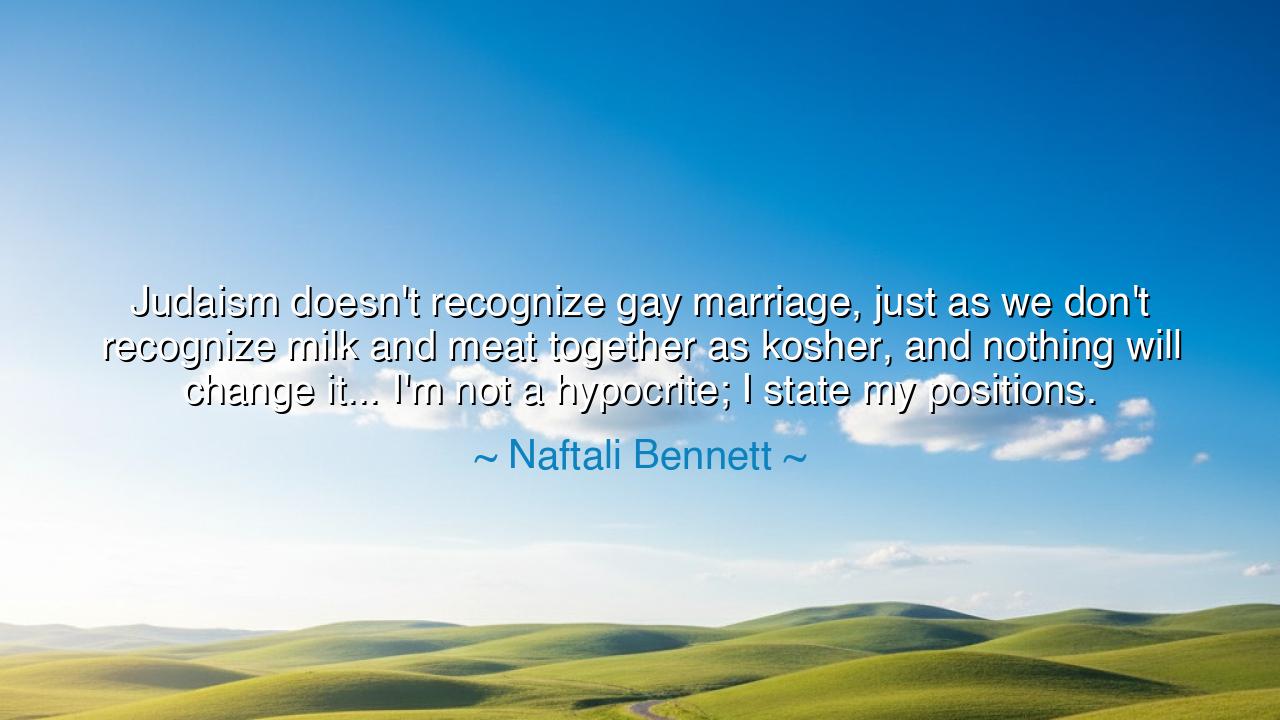
Judaism doesn't recognize gay marriage, just as we don't
Judaism doesn't recognize gay marriage, just as we don't recognize milk and meat together as kosher, and nothing will change it... I'm not a hypocrite; I state my positions.






Hear, O listener, the words of Naftali Bennett, who spoke firmly, without apology: “Judaism doesn’t recognize gay marriage, just as we don’t recognize milk and meat together as kosher, and nothing will change it… I’m not a hypocrite; I state my positions.” In this utterance lies the weight of tradition, the unbending strength of ancient law, and the struggle of the modern age to reconcile heritage with the call of equality. His words echo with the voice of countless generations who have sought to preserve the identity of their people through sacred rules, even as the world beyond their walls has shifted with the winds of time.
He begins by invoking Judaism, not as a passing opinion but as a covenantal tradition rooted in thousands of years of law and practice. In likening the refusal to recognize gay marriage with the dietary law forbidding milk and meat together, Bennett draws upon the symbolic framework of kosher law, where holiness is marked by boundaries, separations, and distinctions. For him, marriage is bound not merely by love or law of state, but by the eternal ordinances given to Israel, immutable as Sinai itself.
The origin of this conviction is clear. From the earliest days, the Torah established laws to guide every aspect of life—what to eat, how to worship, whom to marry, how to live as a people set apart. These laws, though often perplexing to outsiders, were the pillars of Jewish survival through exile, persecution, and dispersion. In equating marriage with dietary restrictions, Bennett emphasizes the continuity of identity: to yield on one law is, in his view, to unravel the tapestry of tradition that has endured for millennia.
Yet his words also reveal the tension of the present age. In a world where many nations have embraced marriage equality, where love between men and women, men and men, women and women is honored equally by civil law, voices like Bennett’s stand as guardians of the old ways. His declaration—“nothing will change it”—rings as both defiance and fidelity, a refusal to bend tradition to the pressures of modern reform. Like the guardians of ancient temples who would not alter the sacred fire, he sees himself as protector of divine decree, regardless of the criticism it brings.
History is filled with examples of such steadfastness. Consider the Maccabees, who in the second century before Christ refused to abandon their ancestral laws under Greek pressure. Though mocked and persecuted, they clung to their customs, believing that survival as a people depended upon obedience to divine command. Whether one agrees or not, Bennett’s words arise from that same lineage of defiance, where tradition is seen not as obstacle but as anchor.
But let the wise also consider the cost of such rigidity. For every tradition preserved, there are individuals whose lives and loves are excluded. In the struggle for equality, many Jews themselves—faithful and observant—cry out for recognition, believing that the heart of their faith is not exclusion but compassion. Thus, Bennett’s words are not the final voice of Judaism, but one among many in the ancient debate of law and mercy, text and interpretation.
O children of tomorrow, what is the lesson? It is this: when confronting the tension between tradition and change, speak not with hypocrisy, but with honesty. State your positions, as Bennett has done, and let others state theirs. For in clarity there is at least respect, even when there is disagreement. But also remember that tradition, though ancient, is never without interpretation, and every generation must wrestle anew with what it means to be faithful—to the past, to the divine, and to one another.
What then must you do? If you hold tradition, hold it with humility, not with cruelty. If you seek change, seek it with respect, not with scorn. And above all, engage in dialogue, for silence breeds only division. In this way, Bennett’s words—though controversial—may serve as a catalyst, reminding us that the path to reconciliation is not through denial but through the courage to speak, to listen, and to wrestle honestly with the meaning of faith, love, and equality in every age.






AAdministratorAdministrator
Welcome, honored guests. Please leave a comment, we will respond soon